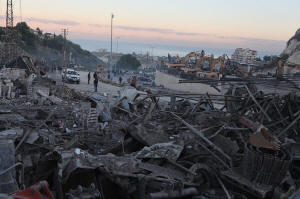Israel still fires on Lebanon almost a year after a ceasefire. Some
predict the same for Gaza
[October 21, 2025]
By ABBY SEWELL
BEIRUT (AP) — As a tenuous ceasefire took hold in Gaza this month,
Israel launched more airstrikes on southern Lebanon — 11 months into a
ceasefire there.
The bombardment of a construction equipment business killed a Syrian
passerby, wounded seven people including two women, and destroyed
millions of dollars worth of bulldozers and excavators.
The Oct. 11 strikes would be an anomaly in most countries not at war.
But near-daily Israeli attacks have become the new normal in Lebanon,
nearly a year after a U.S.-brokered truce halted the latest conflict
between Israel and Hezbollah.
Some see a likely blueprint for the Gaza ceasefire, with ongoing but
lower-intensity conflicts. On Sunday, Israel struck Gaza after it said
Hamas fired at its troops, in the first major test of the U.S.-brokered
truce.
Mona Yacoubian, director of the Middle East program at the Center for
Strategic and International Studies think tank, described the Lebanon
scenario as a “lessfire” rather than a ceasefire.
Lebanon “could well serve as the model for Gaza, essentially giving
leeway to Israeli forces to strike whenever they deem a threat without a
full resumption of conflict,” she said.
A ceasefire with no clear enforcement
The latest Israel-Hezbollah conflict began the day after the Oct. 7,
2023, Hamas-led attack on Israel triggered the war in Gaza. The militant
group Hezbollah, largely based in southern Lebanon, began firing rockets
into Israel in support of Hamas and the Palestinians.
Israel responded with airstrikes and shelling. The low-level conflict
escalated into full-scale war in September 2024.

The ceasefire on Nov. 27, 2024, required Lebanon to stop armed groups
from attacking Israel and Israel to halt “offensive” military actions in
Lebanon. It said Israel and Lebanon can act in “self-defense,” without
elaborating.
Both sides can report alleged violations to a monitoring committee of
the U.S., France, Israel, Lebanon and the U.N. peacekeeping force known
as UNIFIL, but the deal is vague on enforcement.
In practice, Israel has largely taken enforcement into its own hands,
asserting that its strikes in Lebanon target Hezbollah militants,
facilities and weapons.
Israel says it aims to stop the badly weakened group from rebuilding.
Lebanese officials say the attacks obstruct its efforts to get Hezbollah
to disarm by giving the group a pretext to hold onto its weapons.
Lebanon also says Israel's strikes, including the Oct. 11 one, often
harm civilians and destroy infrastructure unrelated to Hezbollah.
Lebanon’s health ministry has reported more than 270 people killed and
around 850 wounded by Israeli military actions since the ceasefire. As
of Oct. 9, the U.N. human rights office had verified that 107 of those
killed were civilians or noncombatants, said spokesperson Thameen Al-Kheetan.
No Israelis have been killed by fire from Lebanon since the ceasefire.
From Nov. 27, 2024, to mid-October, UNIFIL detected around 950
projectiles fired from Israel into Lebanon and 100 Israeli airstrikes,
spokesperson Kandice Ardiel said. During the same period, it reported 21
projectiles fired from Lebanon toward Israel. Hezbollah has claimed one
attack since the ceasefire.
Conflicting narratives
After the Oct. 11 strikes in Msayleh, Israel's army said it hit
“engineering equipment intended for the reconstruction of terrorist
infrastructure in southern Lebanon.”
Lebanese authorities, Hezbollah and the equipment’s owner disputed that.
“Everyone in Lebanon, from all different sects, comes to buy from us,”
owner Ahmad Tabaja told journalists. “What have we done wrong?”

[to top of second column]
|

People gather at a site that sold heavy machinery, where a large
number of vehicles were destroyed in Israeli airstrikes, in the
southern village of Msayleh, Lebanon, Saturday, Oct. 11, 2025. (AP
Photo/Mohammed Zaatari)

Lebanese President Joseph Aoun called the strikes “blatant
aggression against civilian facilities." Parliament Speaker Nabih
Berri accused Israel of seeking to prevent communities'
reconstruction. Lebanon complained to the U.N. Security Council.
A few days later, Israel struck a cement factory and a quarry,
claiming Hezbollah planned to use it to rebuild its infrastructure.
Last month, an Israeli strike hit a motorcycle and a car carrying a
family in Bint Jbeil. It killed Shadi Charara, a car salesman, three
of his children — including 18-month-old twins — and the
motorcyclist, and badly wounded Charara’s wife and oldest daughter.
It was among the highest death tolls since the ceasefire, sparking
particular outrage because of the children.
“My brother was a civilian and his children and wife are civilians,
and they have nothing to do with politics,” said sister Amina
Charara.
Israel’s military said it was targeting a Hezbollah militant, whom
it did not name, but acknowledged that civilians were killed.
Even when the target is a known Hezbollah member, the military
necessity can be disputed.
Earlier this month, an Israeli drone strike killed a Hezbollah
member who was blinded last year in Israel’s exploding pagers
attack, along with his wife. Israel's army said Hassan Atwi was a
key official in Hezbollah’s Aerial Defense Unit. Hezbollah officials
said he had played no military role since losing his eyesight.
The end of ‘mutual deterrence’
Hezbollah was formed in 1982, with Iranian backing, to fight
Israel’s occupation of southern Lebanon at the time. Israeli forces
withdrew in 2000, and Hezbollah grew into one of the region's most
powerful non-state armed groups.
In 2006, Hezbollah and Israel fought a month-long war that ended in
a draw. For the next 17 years, "there was a tense calm ... that was
largely due to mutual deterrence,” said Nicholas Blanford, a senior
fellow with the Atlantic Council’s Middle East program.

Strikes in Lebanon were generally understood to be off limits. Both
sides wanted to avoid another damaging war. Now that equation has
changed.
Though Blanford said Hezbollah could still deliver blows to Israel,
the group's “deterrence has been shattered by the recent war,” he
said.
In an interview with The Associated Press last month, Hezbollah
political official Mohammad Fneish said the prospect of coexisting
with daily Israeli attacks is "not acceptable.”
But the group has largely limited itself to calling on Lebanon's
government to pressure Israel with what Fneish called "its
political, diplomatic or other capabilities.”
He added: “If things develop further, then the resistance leadership
is studying matters, and all options are open.”
Yacoubian, the analyst, said she didn't see the situation in Lebanon
changing any time soon, “barring a breakthrough in behind-the-scenes
negotiations brokered by the U.S.”
With the Gaza ceasefire, she said, the difference could be the
“significant role” of fellow mediators Qatar, Egypt and Turkey.
___
Associated Press journalist Ahmad Mantash in Msayleh, Lebanon,
contributed to this report.
All contents © copyright 2025 Associated Press. All rights reserved |